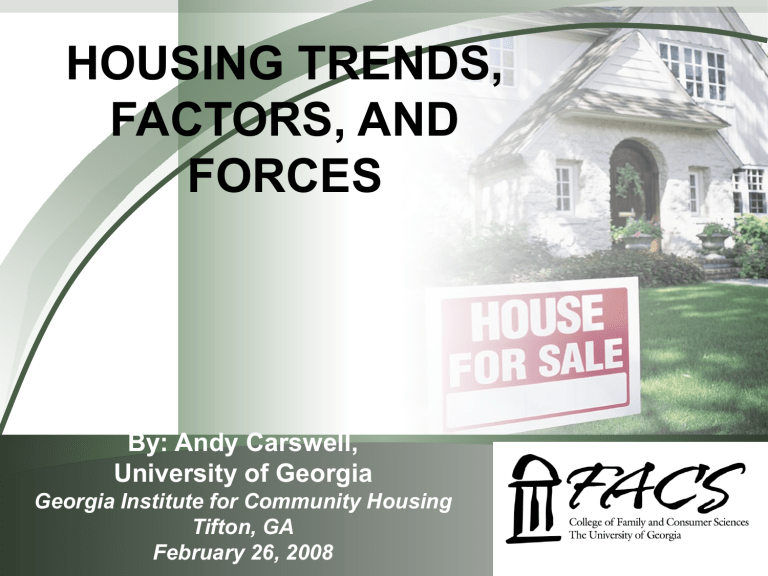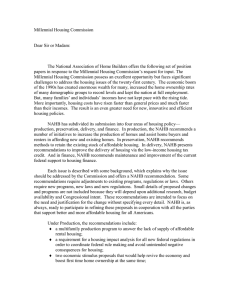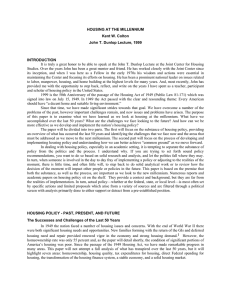HOUSING TRENDS, FACTORS, AND FORCES

HOUSING TRENDS,
FACTORS, AND
FORCES
By: Andy Carswell,
University of Georgia
Georgia Institute for Community Housing
Tifton, GA
February 26, 2008
Single-Family Housing Starts
1,900
(Thousands of Units, SAAR)
1,700
1,500
1,300
1,100
900
700
500
89 90 91 92 93 94 95 96 97 98 99 00 01 02 03 04 05 06 07 08 09
Source: NAHB
12
Multifamily Housing Starts
500
(Thousands of Units, SAAR)
450
400
350
300
250
200
150
100
89 90 91 92 93 94 95 96 97 98 99 00 01 02 03 04 05 06 07 08 09
Source: NAHB
13
Housing Starts Per Capita
0.010
0.009
0.008
0.007
0.006
0.005
0.004
0.003
CA, AZ, NV, FL
All Other States
MI, IN, OH
0.002
0.001
0.000
1998 1999 2000 2001 2002 2003 2004 2005 2006
Source: New York Federal Reserve, Economy.com, Mortgage Bankers Association of America
0.010
0.009
0.008
0.007
0.006
0.005
0.004
0.003
0.002
0.001
0.000
New Home Sales
1,400
(Thousands of units, Seasonally Adjusted)
1,300
1,200
1,100
1,000
900
800
700
600
500
400
300
89 90 91 92 93 94 95 96 97 98 99 00 01 02 03 04 05 06 07 08 09
Source: NAHB
11
12
Percent
Prime Conventional Conforming
Home Mortgage Rates
Fixed-Rate Mortgages
10
8
6
4
Adjustable Rate Mortgages
2
0
89 90 91 92 93 94 95 96 97 98 99 00 01 02 03 04 05 06 07 08 09
Source: NAHB
10
Real GDP Forecast
4.5%
4.0%
3.5%
3.0%
2.5%
2.0%
1.5%
1.0%
0.5%
0.0%
0.6%
3.8%
3.9%
1.5%
2.3%
2.4%
2.5%
2.6% 2.6% 2.6% 2.6%
2007
Q1
2007
Q2
2007
Q3
2007
Q4
2008
Q1
2008
Q2
2008
Q3
2008
Q4
2009
Q1
2009
Q2
2009
Q3
2009
Q4
2.6%
Source: NAHB
Unemployment Forecast
5.0%
4.9% 4.9% 4.9% 4.9% 4.9% 4.9%
4.8%
4.7% 4.7%
4.8% 4.8%
4.6%
4.6%
4.5%
4.4%
4.5% 4.5%
4.3%
2007
Q1
Source: NAHB
2007
Q2
2007
Q3
2007
Q4
2008
Q1
2008
Q2
2008
Q3
2008
Q4
2009
Q1
2009
Q2
2009
Q3
2009
Q4
4.9%
Vacant Year-Round Housing Units on the
Market
(000s)
No. of Units
(left scale)
(Percent)
6500
6000
5500
5000
4500
4000
3500
3000
2500
% of Housing Stock
(right scale)
2000
80 81 82 83 84 85 86 87 88 89 90 91 92 93 94 95 96 97 98 99 00 01 02 03 04 05 06 07
6
5
4
3
2
6
Georgia and Projected Household
Growth
Top 5 Counties
•
Chattahoochee (+58%)
•
Barrow (+32%)
•
Newton (+31%)
•
Paulding (+30%)
•
Forsyth (+29%)
Bottom 5 Counties
•
Butts (-30%)
•
DeKalb (-19%)
•
Liberty (-18%)
•
Taliafero (-13%)
•
Ware (-13%)
Percent of Defaults Due to Non-Owner
Occupied Loans
Nevada
Arizona
Florida
California
All other states
Total US
Prime Loans
Percent of Share of prime home prime defaults due to non-owner occupied loans as of purchase loan originations for nonowner occupied properties in 2005, based on HMDA
June 30,
2007
32%
26%
25%
21%
13%
29%
29%
32%
14%
15%
16% 17%
Nevada
Arizona
Florida
California
All other states
Total US
Subprime Loans
Percent of Share of subprime subprime defaults due home purchase loan originations for nonto non-owner occupied loans as of owner occupied properties in 2005, based on HMDA
June 30,
2007
24%
18%
14%
14%
14%
15%
11%
15%
7%
10%
12% 10%
Source: MBA, Home Mortgage Disclosure Act 2005 Report
Mortgage Delinquency Data
Source: Equifax/Moody’s Economy. COM
Historical Data Patterns
Industry and Market
Determinants of Foreclosure
• LTV Ratios (+)
• House Price Appreciation (-)
• Sub-Prime Lender (+)
• Mortgage Type Non-FRM (+)
• Savings Rate (-)
• Servicing by Primary Lender (-)
• Interest Rates (+)
Human/Individual Factors
Associated with Foreclosure
• Divorce (+)
• Health Care Exps. (+)
• Unemployment (+)
• Seasonal Nature of Job (+)
• # of Dependents (+)
• Non-Housing Wealth (-)
• FTHB Status (+)
• Gambling (+)
Pre-purchase Homeownership Counseling’s Effects on
Default and Foreclosure
• Positive effect overall as a risk mitigator
• Little in the way of followup procedures
• Questionable purchasing behavior of FTHB
• More vulnerable to predatory lenders after origination than before
Community Costs of Foreclosure
• Fire Risks
• Increasing Crime
• Administrative/Municip al Costs
• Property Value Effects
Foreclosure and Mortgage Fraud
• Fraud-for-property schemes vs. fraud-forprofit schemes
• Clustering effect
• Adverse community effects
• Difficulty in researching fraud effects on foreclosure
Mortgage Fraud – Case Study
Concentration of Mortgage Fraud
So, Who’s To Blame for the
Affordability Problem?
• Land as a finite resource
• Government infatuated with homeownership
• Liberalized financing of mortgages
• Building codes
• Mortgage fraud
• Suburbanization
• Housing norms
• Inflexible nature of market rents
• Lack of availability of Section 8
• Growth of subprimes
• The dominance of the “stick-built” market
Possible Solutions to
Affordability Problem
• Solid, yet realistic, homeownership counseling programs
• Reducing the stigma of manufactured housing
• Reducing the influence of the sub-prime market
• Living wage campaigns
• Land trusts
• Housing trust funds
Other Housing Items Dominating My World
•
Predatory lending and anti-fraud legislation
•
Rise of gated communities
•
Rise of New Urbanism
•
Effects of foreclosure laws on bankruptcy behavior
•
Housing (in)equality
•
Appraisals, assessments, and proper valuation
•
Residential property management
•
Employer-assisted housing
Any Questions?
Andrew T. Carswell, Ph.D.
Assistant Professor
Dept. of Housing & Consumer Economics
University of Georgia
109 Dawson Hall
Athens, GA 30602
Ph: (706) 542-4867
Fax: (706) 542-4397 carswell@fcs.uga.edu




